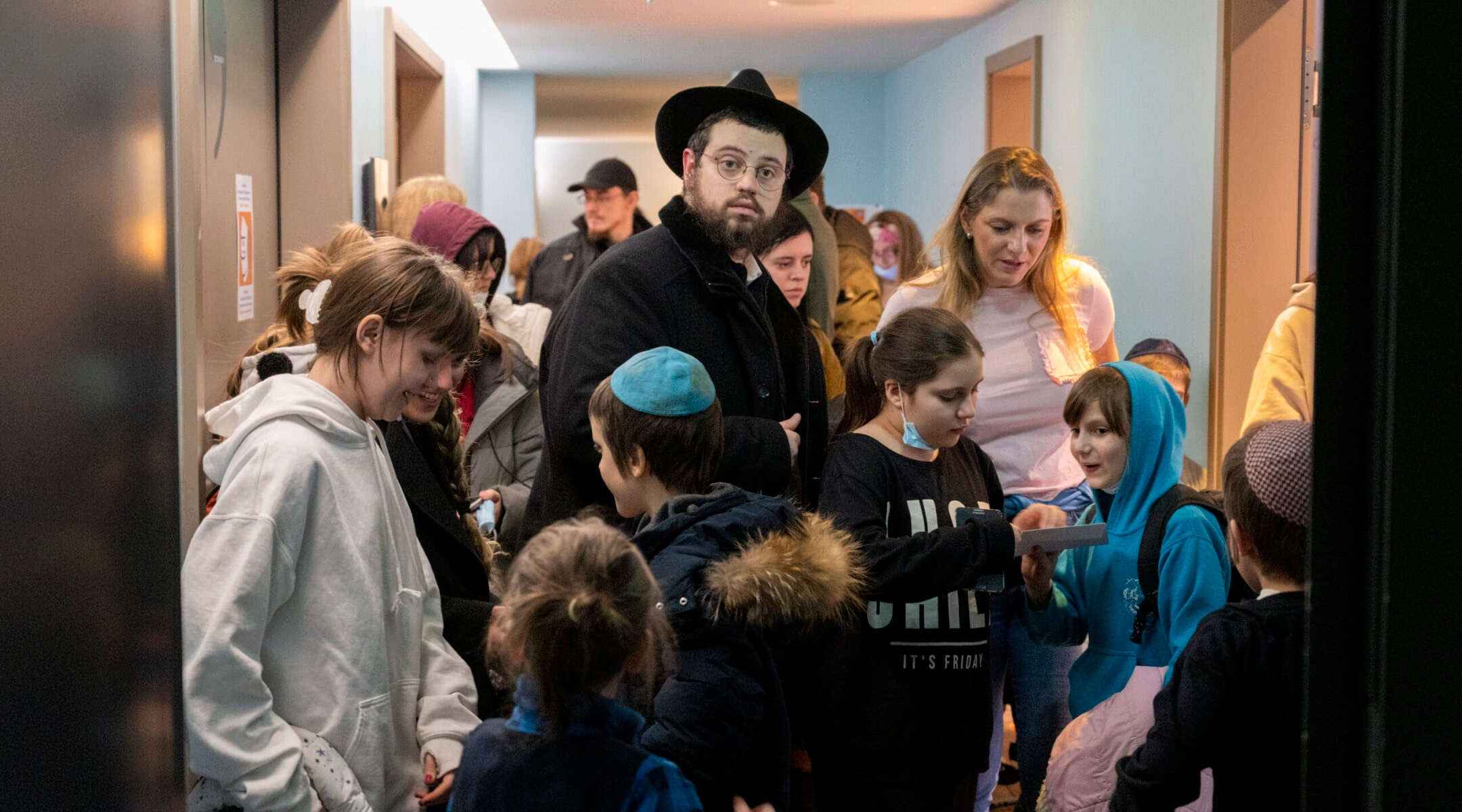ODESSA, Ukraine (JTA) – A year after Rabbi Mendy Wolff spirited 120 children and staff away from the Mishpacha Orphanage in this war-torn country to the safety of Berlin, he is preparing to bring many of them home.
That’s not because the war is over — far from it. One year after Russian tanks first rolled into Ukraine, fighting grinds on and much of Ukraine has been plunged into austerity conditions.
Instead, the children of Mishpacha are headed back to Odessa in large part because of the high cost of keeping them fed, housed and educated in Germany. While the German government and local Jewish community have covered many costs, Chaya Wolff, Mendy’s mother and the wife of Odessa’s chief rabbi, Avraham Wolff, said the price tag had risen to 750,000 euros — close to $800,000 — a month. They’ll join other Ukrainians who have returned to their homeland as it became clear that the war would not end quickly.
“We could have bought seven buildings for the [Jewish] community in Odessa with that money,” she said from Odessa, where she stayed along with her husband after the Russian invasion to care for remaining Jews in the city, where the Wolff family operates Chabad of Odessa. “But now the money is finished and it’s time to bring our children home.”
Mendy Wolff said that when he first headed to Berlin several days after Russia’s Feb. 24, 2022, invasion, he expected to return home in a matter of days. He had become the orphanage’s director overnight, when his parents tasked him with getting the children out of Ukraine. He and his wife, Mushky, had instructed their charges to pack two of each item of clothing.
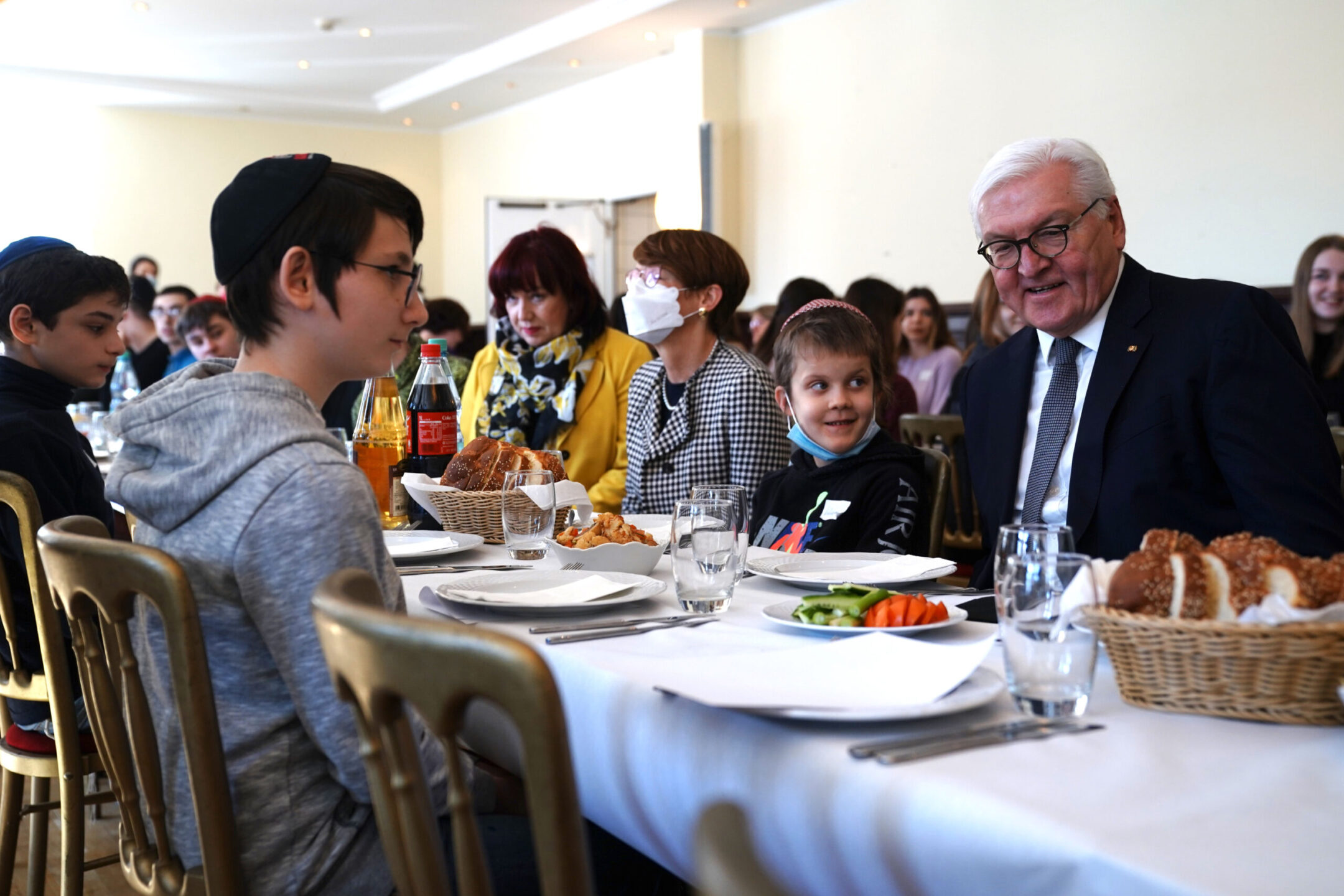
German President Frank-Walter Steinmeier talks with refugee children from the Jewish community in Odessa at a Chabad center in Berlin two days after their arrival as refugees, March 7, 2022. (Clemens Bilan – Pool/Getty Images)
“As I was packing, I remember spotting my Megillat Esther on the shelf and thinking I won’t be needing that because Purim is two weeks from now and we’ll be back by then,” Wolff told the Jewish Telegraphic Agency, referring to the biblical book traditionally read on Purim.
The journey to Berlin took 53 hours and traversed five international borders, but Wolff and his wife tried to make the atmosphere as fun as possible for the children.
“We sang songs all the way and even though most of the children knew what was happening, we made it feel like summer camp — only in the winter,” Wolff said.
Getting the children out of Ukraine meant pulling strings of all kinds, since most did not have passports or even original birth certificates. Most of the children in the orphanage have parents who are unable to care for them; Wolff got the parents’ permission to take the children out of the country, a challenging task in the chaos after the invasion. “That is why we didn’t escape on the first day of the war,” he told JTA from Berlin at the time.
For 40 children for whom no living relatives could be found, Rabbi Avraham Wolff and his wife, Chaya, signed on as legal guardians. The Chabad emissaries in Berlin managed to secure VIP status for the young refugees to bring them across EU borders as personal guests of German President Frank-Walter Steinmeier, who greeted them on their arrival in the German capital.
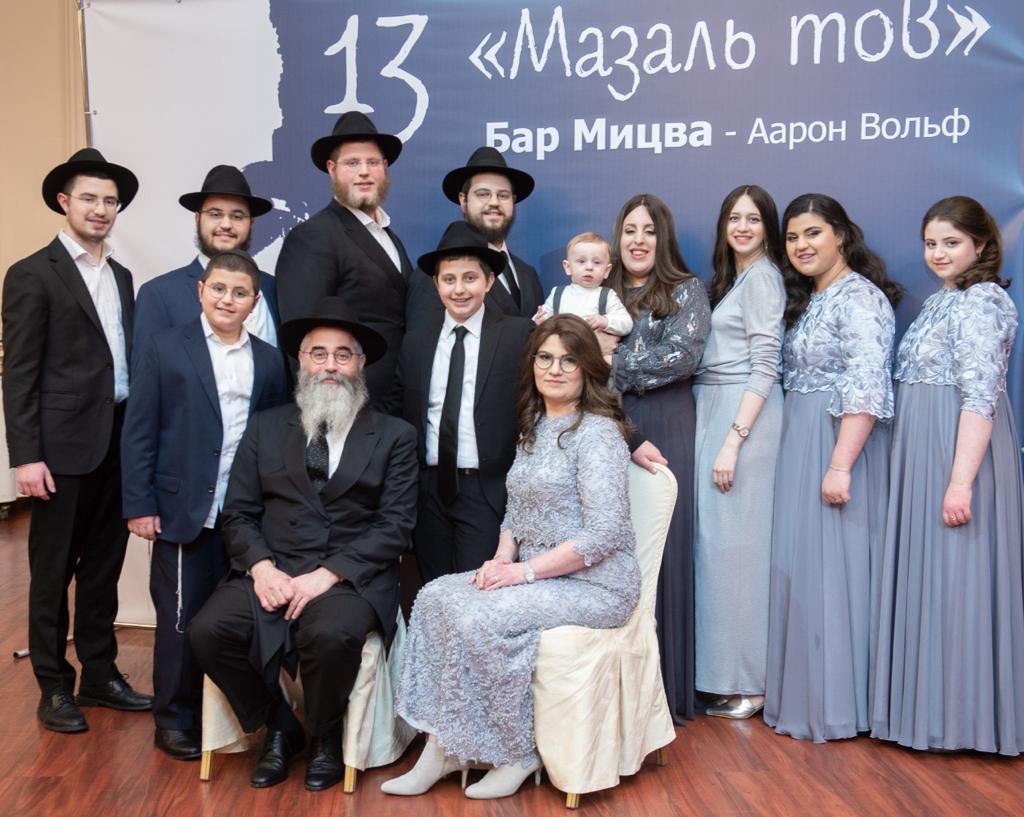
The Wolff family operates Chabad of Odessa. Rabbi Avraham and Chaya Wolff are sitting. Rabbi Mendy Wolff, who has overseen the children relocated from the group’s orphange to Berlin, is at the center in the back row. (Courtesy Chabad Odessa)
The children and orphanage staff were joined by other Odessians: university students, single mothers and their own offspring. Their flight and warm welcome in Berlin captured international headlines.
“Everyone knew there was an orphanage coming,” Mendy Wolff told JTA in Berlin shortly after the group’s arrival. “It was an unbelievable hug. It made us feel good in our hearts.”
But even then, the high cost of caring for the children in Berlin was weighing on the volunteers who leapt to help them. “We’ve received an outpouring of support from the community and beyond, lots of clothes and other supplies, but what we really need now are financial donations — only the food for all the children costs about 5,000 euros every day,” one told the Associated Press at the time.
The German government paid for all Ukrainian refugees to lodge in hotel rooms, and fundraising by both Mishpacha and the Berlin Jewish community covered other costs, including food and services for children and adults. Over the next six months, the group celebrated not just Purim but half a year of Jewish holidays, as well as the gamut of Jewish lifecycle events, from bar mitzvahs to births and brises.
But in the late summer, the hotels asked to have the rooms back. Many of the refugees moved to a center operated by Chabad of Berlin, but Mishpacha opted to keep the children from its orphanage together in a different location, Hotel Müggelsee, on the banks of Berlin’s largest lake of the same name.
The group rented the whole hotel both to make it possible to have schooling and other services on site, and for security reasons, Chaya Wolff said. But the choice meant that the government housing subsidy would not cover all of the group’s housing costs.
“We have more rooms than we need,” she said. “But we cannot take in other people because we do not know them. We have a lot of children and we need to be safe.”
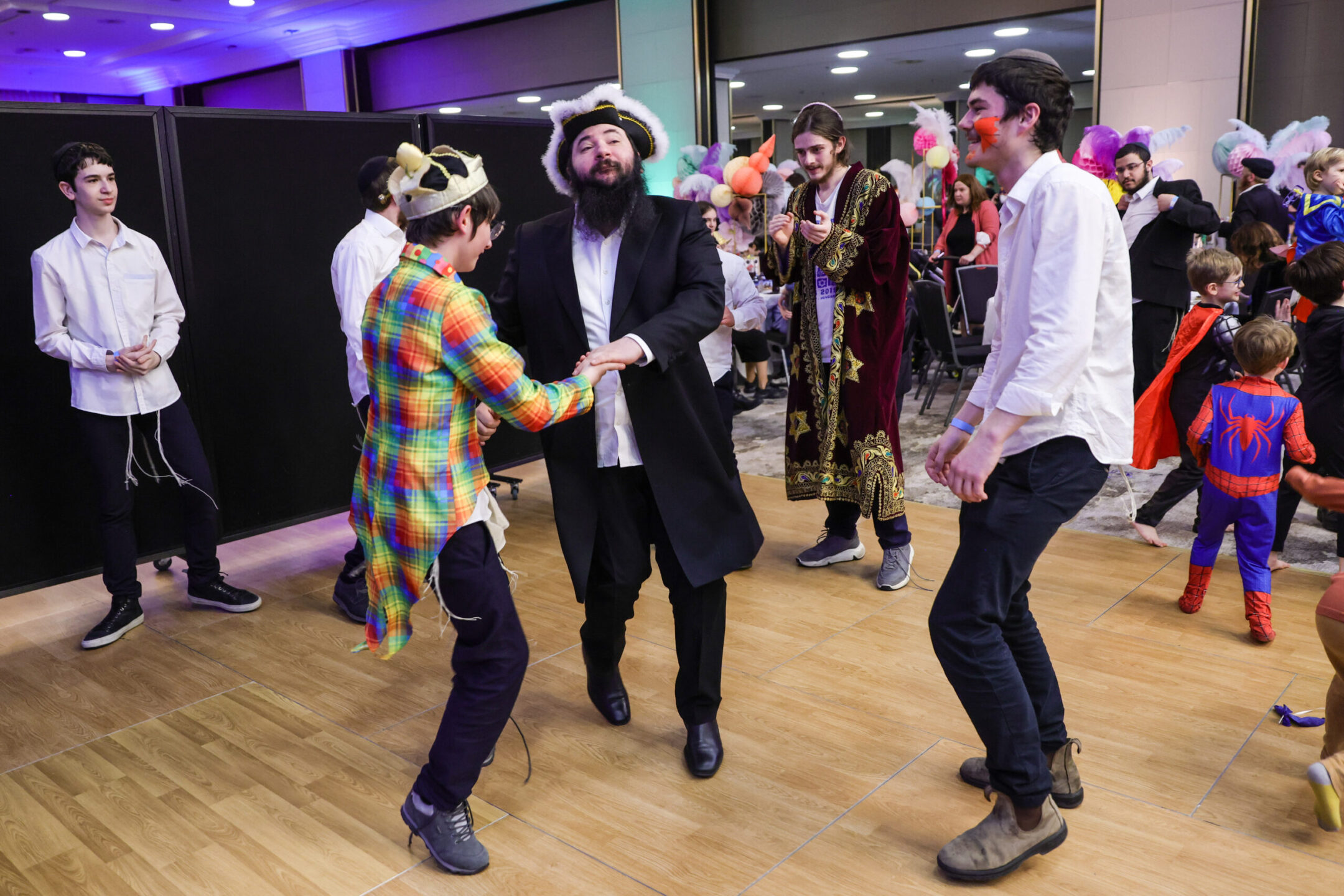
Jewish children from Odessa in war-torn Ukraine celebrate Purim 2022 with members of the Chabad Berlin Jewish community, March 17, 2022. (Omer Messinger/Getty Images)
The group recently celebrated the first birthday of the youngest child to make the trek from Odessa, Tuvia, who was just 5 weeks old when he arrived in Berlin.
For Wolff, the hardest part was grappling with the unknown. “It was very similar to what people experienced at the beginning of the coronavirus pandemic. You don’t know who it will infect or how many people will die or how long you’ll need to live like this.”
Like many others, Wolff was certain that Russian President Vladimir Putin’s army would crush Ukraine in a matter of days. “With each passing day we saw that the Ukrainians were far more resilient than we had given them credit for and that the Russians weren’t as much as superheroes as we thought.”
The irony that Germany, and not Israel, became the host country for Jewish refugees from Eastern Europe is not lost on the Wolffs. While Mendy is reluctant to express political opinions of any kind, his mother, Chaya, is more forthright, saying that Israel had refused them entry.
Mark Dovev, the regional director of Nativ, the Israeli government office that facilitates immigration to Israel from the former Soviet Union, later told JTA that taking in a minor from another country is “tantamount to kidnapping.” Brushing off Dovev’s objections, Chaya Wolff said, “Just as Germany turned a blind eye, Israel could have also taken them in temporarily as refugees.”
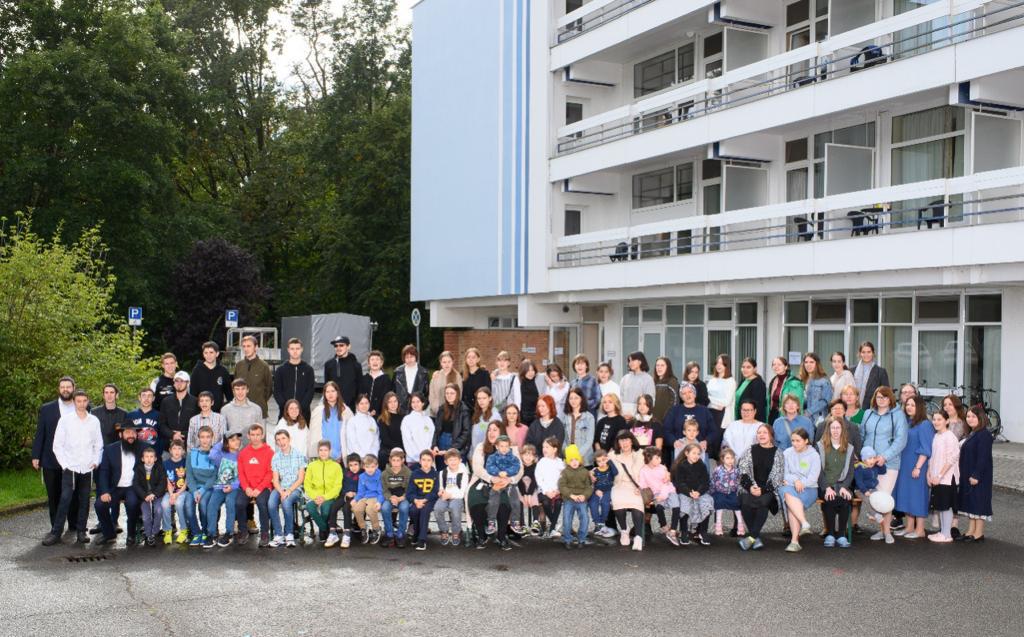
The children and staff of Mishpacha Orphanage in Odessa pose outside the Hotel Mugglesee in Berlin, their home for nearly a year since fleeing war in Ukraine. (Courtesy Chabad Odessa)
Since German law bans homeschooling, the children were required to enroll in a local school as well as to learn German. German authorities allowed the student body to largely adhere to the Ukrainian curriculum, however, and they were taught by a handful of the women refugees who happened to be teachers. Starting in the fall, the hotel, which functioned as a dormitory, doubled as a branch of the local Chabad school — replete with classrooms and a schoolyard.
But keeping the refugees in Berlin came at a steep price, even with aid from the government, Jewish community and various donors such as the International Fellowship for Christians and Jews as well as private donations. An online fundraiser netted $685,500 in small gifts from more than 5,000 donors — a significant tally, but far short of its $1 million goal. So it was mostly out of economic considerations, then, that the Wolffs decided to close up shop in Berlin and bring many of their refugees home later this month.
About 100 people are set to travel on two buses on Monday, three days after the first anniversary of the war’s onset, according to Chaya Wolff. Some members of the Mishpacha group, opting to stay, have moved in recent weeks back to the Chabad-run Jewish refugee center in the heart of Berlin, where hundreds of Ukrainian Jewish refugees remain. A second building is being constructed to accommodate the need, according to Rabbi Yehuda Teichtal of the Jewish Community of Berlin.
“It is really amazing to see what is going on here,” Teichtal said. “You walk into the Jewish refugee home, especially on a Shabbat, when everyone is here, and you see the real spirit of Jewish community. People are settling down, taking language courses, really developing into the whole community. It’s a powerful expression of Jewish continuity and endurance.”
Yet while some Ukrainians say they are unlikely ever to return to their country, and others say they won’t while the war rages, the Wolffs and their charges are hardly the first Ukrainians to make their way back home. Many of them have cited the high cost of life abroad, along with separation from family and guilt about abandoning their country, for coming back to a warzone. So many Ukrainians were returning last fall that the country’s leaders urged them to wait until this spring to return, lest they tax fragile infrastructure.
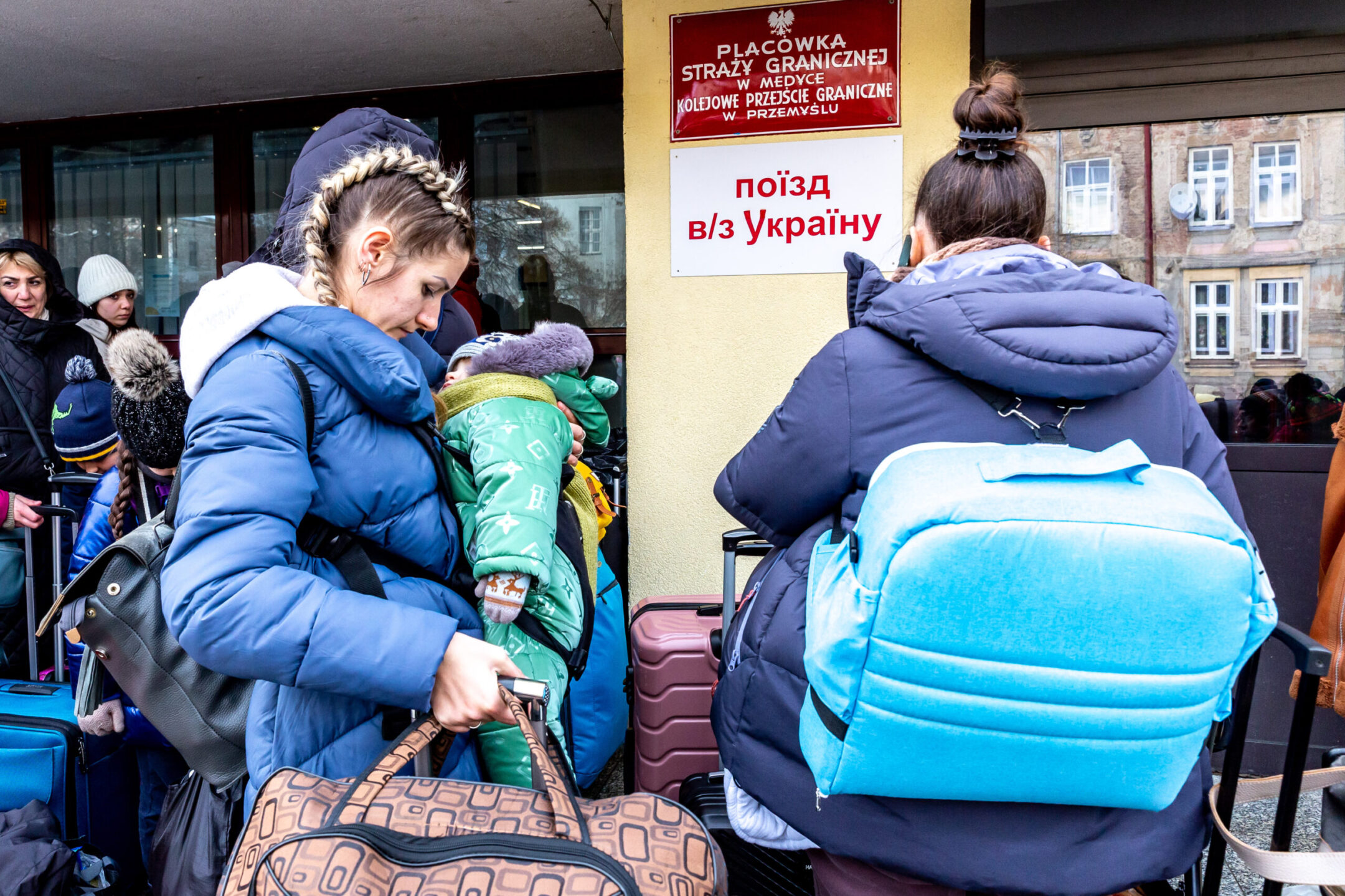
Ukrainians queue at the railway station in Przemysl, Poland, to depart for Ukraine, amid a reversal in migration patterns as the Ukraine war ground on, Dec. 20, 2022. (Dominika Zarzycka/NurPhoto via Getty Images)
According to Mendy Wolff, his group would be staying in Berlin were it not for budgetary concerns. Still, he said, there were many positive aspects about the decision to return home.
“Psychologically, it’s not easy being here. You’re not living like a human. It’s like living on borrowed time and in a refugee camp, albeit a luxury refugee camp,” he said. “I’m very excited to be in my own bed and my own blankets.”
For both mother and son, the responsibility of bringing the refugees back to a country that is still very much at war weighs heavily. Odessa is faring better than many other southern Ukrainian cities like Mykolaiv and Kherson to the east, which have suffered daily shelling. Still, air raid sirens sound multiple times a day and there is no electricity for 20+ hours. But as long as residents have access to bomb shelters and generators — including the kind made from car batteries that Avraham Wolff recently held a fundraiser to buy — Chaya Wolff describes it as “livable.”
“It’s not an easy decision and we hope it’s the right one,” Chaya Wolff said. “At the end of it all, we’re ‘believers, the children of believers,’” she added, quoting the Talmud.
But she said the group has a backup plan if Russia launches a new offensive to mark the one-year anniversary of its invasion, as many fear it will do. “We can stay for another month,” she said. “We don’t want to, and we don’t have money for this, but we can stay if we need to.”
Toby Axelrod contributed reporting from 2022 in Berlin.
This story has been corrected to show that the Mishpacha group moved to the Hotel Muggelsee in September 2023. It has also been updated to reflect more information about efforts to support Jewish refugees in Berlin.
JTA has documented Jewish history in real-time for over a century. Keep our journalism strong by joining us in supporting independent, award-winning reporting.
